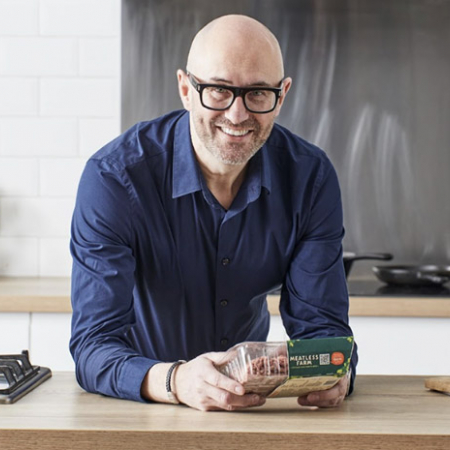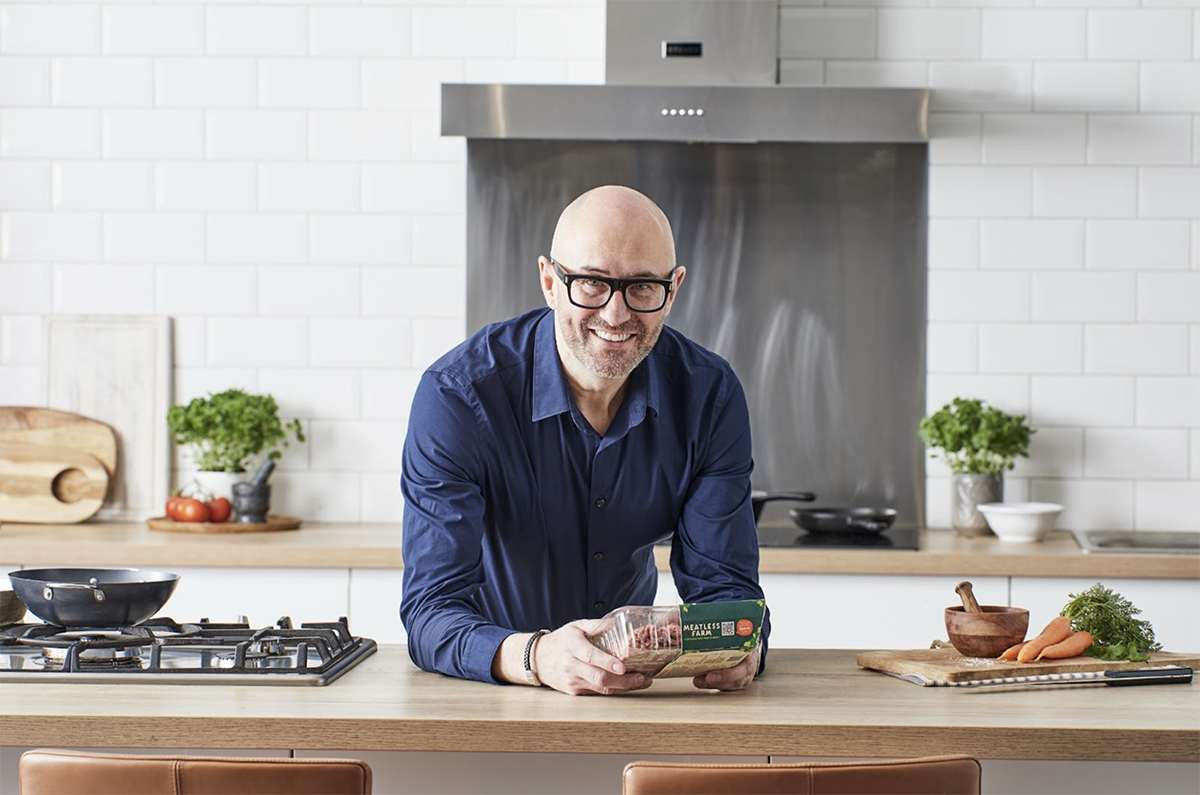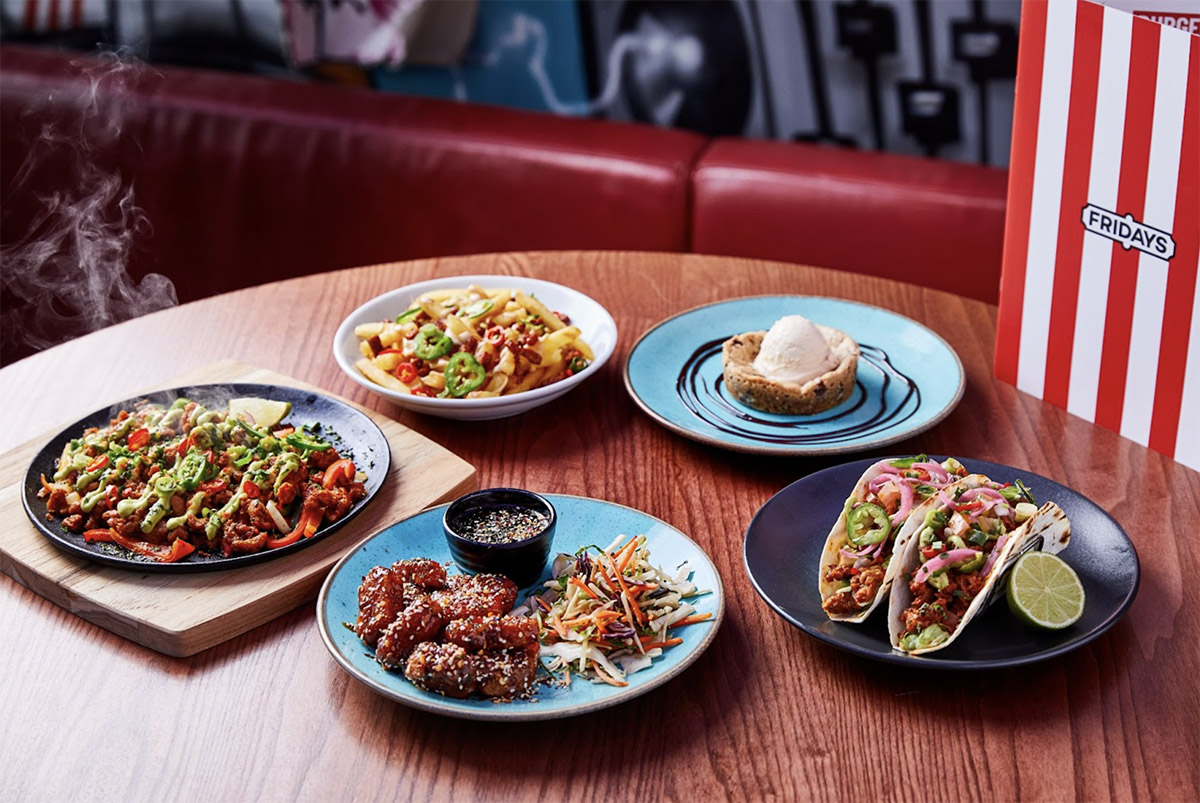June 2, 2022
Madaline Dunn caught up with Michael Hunter, Managing Director of Meatless Farm, to learn more about how the company is making plant-based food more accessible and how going plant-based even one day a week can significantly reduce our collective carbon footprint.


Recent reports from the IPCC and WWF have made it clear that globally, we must eat less meat to stave off ecological disaster. New research published in the Annual Review of Resource Economics even outlines that in high-income countries, meat consumption must be reduced by at least 75%. Change is happening, but slowly. In Britain alone, 20% of people are now eating less meat to actively fight climate change. But how do we collectively hit that 75% mark? One company that has been on a mission to reduce meat consumption is Meatless Farm, a plant-based company founded back in 2016 that uses pea protein as the base of its products.
Since its inception, Meatless Farm has been dedicated to finding new ways to make going meat-free more accessible, sustainable and tasty. Alongside its many plant-based innovations, the company also participates in a wide range of research projects and initiatives to drive home the message that small dietary changes can make a big difference environmentally.
I had over 20 years working at Kellogg, and one of the most exciting parts of my career was working on the Morningstar Farms brand, one of the leading plant-based brands in the USA. This was back in 2012 before plant-based eating was accelerated to the forefront of consumer minds. So, when this opportunity came along, it wasn't really a difficult choice. It was coming back to a category that I really liked: super exciting and one of the most fast-paced categories within grocery. There was also the fact that the plant-based sector still only has 26% household penetration. There are so many consumers who have not engaged in the category yet and so much potential for the future.
Coming into the smaller startup arena, my experience from working at a large Fortune 100 company helped a lot, especially in terms of making sure the strategy and plans are clear and, most importantly, that the team understands the part that they play. It's really important to develop a mindset and culture of working as one team with one common goal. For us, that common goal is to make the switch to plant-based foods and meat alternatives easy by delivering great-tasting food that's affordable and accessible.
The company was founded in 2016 by Morten Toft Bech. At the time, he had a young vegetarian family, but struggled to feed his kids without them pushing their plates away from the table. He wanted to create something that the kids would be more willing to accept and eat while maintaining a plant-based diet. So, that's when he developed the company’s mince product. This product first launched in 2018 exclusively with Sainsbury's but we're now available in more than 20 countries worldwide, with a presence in Europe, the US, the Middle East and Latin America. While our portfolio started with mince, we've expanded significantly. We now have a large portfolio providing a variety of meat alternatives that can be applied across many different applications, whether that's food service, QSR, or casual dining.
Fundamentally, our mission is to get people to reduce their meat consumption by making the swap to meatless easy. Our focus is on encouraging people to eat less meat rather than no meat and making small changes without having to compromise on taste. We want to make sure we're not niche but appealing to the mass market, the ‘everyday consumer’. It's not just vegans and veggies, but the flexitarians, too, because that's where the most significant impact on the environment can happen. Getting everyone to make small changes, e.g., switching one meal out each day or once a week, can have a massive impact.

When we first started, we began with a soya-based portfolio, but the more we looked at the environmental impact and balancing that with health, taste and texture, pea was really the protein that took us forward. Choosing pea protein also had the added benefit of avoiding soya allergens. So, we focused on pea, which ensures we maintain maximum nutritional value while delivering on our commitment to create a kinder food system.
Partnering with Equinom allowed us to reduce our energy and water usage by around 50%, which is really important, and the interesting thing is that its pea-protein delivers 15% more protein than other products. Equinom allowed us to drive toward our ambition of a net-zero supply chain while meeting the demand for allergen-free and high-protein plant-based sustainable products.
We have our own in-house technical and innovation team who work out of our office in Leeds, where we have our development kitchen. There we make lots of different kinds of food in a mini-factory setting. We try different formulas, blends and textures, test them, and then take that to the factory to scale up.
The team is predominantly focused on innovation and recipe development but we don’t only work on upcoming recipes and concepts; we also spend a lot of time reviewing, renewing and improving our existing formulas and recipes to improve taste, texture, nutrition and sustainability. There's a learning continuum as different types of protein start to get discussed and used, whether that’s fava bean or hemp. These different proteins change the texture and taste a product delivers.
So, while the category is still relatively new, there's a huge amount of innovation and improvement to technology that will come from those new textured vegetable protein (TVP) types of blends. It's about creating ingredients to function, not creating ingredients to fit and that means that as you develop, the iterations become bigger leaps.
Globally, the biggest challenge has been the consistency of the TVP because it's from a variety of sources from around the world and it all depends on whether you're using pea, soya, or some other source of TVP. Good quality protein has been hugely popular for manufacturers, which can create pressure in the global supply chain but we're very fortunate in that we have a facility within Canada and an integrated supply chain that enables us to have access to consistently high-quality TVP and, most importantly, allows us to have supply chain transparency.
The pandemic has been interesting in many ways but concerning plant-based and meat alternatives I think people's mindsets have shifted massively. People paused and thought differently about the connectivity between our daily actions, what we eat and how it impacts the planet and our wellbeing. Following the lockdown, people have continued to eat healthier diets, and lifestyles. One British Nutrition Foundation survey found that people are looking for more fruit and vegetables in their diets and starting to look at nutritional labels. I think that kind of approach to diet is only going to grow.
We also did some research which showed almost half of the UK population (43%) plans to eat more plant-based foods in 2022. This is compared to just 9% in 2019 so there's been a massive shift in people's awareness of plant-based food and how it links to the environment, animal welfare, and personal health and wellbeing.
As we continue to improve the quality of plant-based offerings and bring in exciting innovations and new formats, it will only make it more appealing to consumers.
I think it’s an evolution of people not wanting to be labeled. The research we did was about people's preference for having non-meat products labeled as plant-based rather than vegan. There was a time when you would ask for the vegan menu in a restaurant and they had to pull it out from under the counter and dust it off but today there are a variety of vegan options that are included within a menu. That said, sometimes people perceive these offerings as being different from what their friends are eating, which can be off-putting.
We've just launched with the cocktail bar and restaurant brand The Alchemist and it's got a variety of non-meat offerings. Now, half of its menu is plant-based and it's using that description on its menus. It’s a more progressive approach and more in tune with consumer sentiment.
We were super excited about working with Fridays as a nationwide chain and a huge opportunity to make plant-based options accessible to everyone. It's a great place for families to go and eat but its menu is very meat-orientated. They realized they needed to offer guests the choice of meat alternatives so it was a great chance to reach new consumers, and show them that meat alternatives can still be tasty and exciting.
We replicated its legendary sesame chicken strips, with a meat alternative chicken base. We think it's one of our best products to date - even the Friday's team described it as indistinguishable. We also added chicken fajita pieces to be included within fajitas and tacos and created bacon bits for the loaded fries.
If you look at the broad spectrum across the industry, there's a massive shift towards guests being offered a great meat alternative without having to compromise on their favorite dish. Consumers expect to have this as the new norm when they go to a restaurant. It's all about making it inclusive.
We're not anti-meat or pro-vegan, we advocate for eating less meat, so for us, every little does help. It's about reaching more people and getting them to make small changes, and allowing them to try something new. Inclusive menus should be available everywhere, whether it's a McDonald's or not. I think from McDonald’s perspective, it's only adapting to meet changing consumer behavior and I think it just shows if you've got a chain like McDonald's putting a plant-based burger on the menu, there is demand.
That said, we can't let the small changes distract us from pursuing big shifts - we need them to be made as well, which means addressing food waste, intensive farming practices, and pro-animal welfare. I wouldn't describe what McDonald's is doing as greenwashing but greenwashing is an issue. There is an assumption that just because something is plant-based, it’s a sustainable and eco-friendly product and that's where transparency is key. As any brand knows, trust is key, and you can't mask or manipulate your sustainability efforts and be dishonest.
To ensure we're being transparent, we've partnered with a company called Mondra to put our sustainability footprint on our products' packaging. This footprint will be measured much like nutritional scoring is on a one to five rating. This sort of thing is key whether you're Meatless Farm or McDonald's because transparency is important to consumers.

Meatless Farm (TGI) Fridays
There's a myth that needs to be debunked that all plant-based products are overly processed and lacking in nutritional value. Our products and the products of many other plant-based manufacturers use very simple ingredients. In fact, in our case, we have less than ten easily understandable ingredients that are all-natural with nothing artificial: pea and rice protein, beetroot juice, carrots, spices; they're ingredients you would find in your cupboard at home. For us, it's all about simple ingredients and minimal processing.
Education around plant-based nutrition is key and we believe it's especially important for children. We've made it our mission to educate children because more than half have expressed interest in learning more about how to eat more sustainably. If you go into schools today, kids are very well-versed in the environment and the climate crisis. It's important they know what their choices are.
One of the ways we are helping out in that area is through working with school caterers in partnership with Omari McQueen - the UK's youngest vegan chef at age 13 - and ProVeg, the food awareness organization. Through this partnership, we've launched the Green School Menu League, which identifies the stage schools are at in terms of their sustainable eating journey. By teaming up with ProVeg, we're giving them resources to help them understand more about plant-based foods and how easy it is for them to incorporate them into their school menu.
Our products were used in a control study that looked into the impact of plant-based diets on the gut microbiome and compared it with meat-based diets. The results were that a plant-based diet led to positive changes in the microbiome, which is really important for overall health and wellbeing, affecting both your heart health and your brain health.
So, again, we advocate for a balanced approach. We don't expect people to use our products for every meal but we strive for nutritional products that debunk the myth that protein is best sourced from meat, hence why we use pea protein and why our chicken breast has 17 grams of protein. Again, it's not about swinging the pendulum one way or the other; it's about how you approach diet as a whole.

Meatless Farm: Leon / Meatless Farm: The Alchemist
It's a real-time crisis on our doorstep. If you look at intense farming practices, agriculture's land and water usage, and the fact that we're burning forests to grow soy to feed animals, it feels like the food ecosystem is broken. If we're planting crops, surely they should go to humans rather than animals. Let's let the animals eat the grass they were supposed to eat.
From our perspective, we use 90% less land, and 70-80% less water than our meat counterparts while also contributing to biodiversity. The environment is at the heart of our brand, and our mission is to reduce the world's meat consumption by 50%. We need more action and better consumer awareness around land usage, water wastage and the food waste that exists in the supply chain, because that's another huge issue that needs to be tackled. We need consumers to be better informed so they can make active choices today to protect tomorrow’s food supply chain.
There's a bit of a myth regarding people's perception of their individual impact. They think: "I'm only one person; I can't make a significant impact," but we did a study with Dr. Joseph Poore in 2018, and found something incredible. If every single person in the UK were to switch out one meal a week to plant-based, we could cut UK greenhouse gasses by up to 8.4%, which is the equivalent of getting 16 million cars off the road. So, it really is about the small steps people can take that collectively has a massive impact. That's the kind of action people need to take today, rather than sitting and waiting for the big initiative to happen because it's the small initiatives that have a big impact.
We've just launched a chicken breast alternative to allow consumers to use it for a range of applications. It's all about giving the consumer the ability to personalize what they want to make, so they don't feel like they are compromising; we're also doing that with a steak we're launching. We've also entered the convenience arena with a snacking portfolio that includes gyoza, samosas and wontons.
We recently launched into the frozen-food category, too. We now have a portfolio of five products launching into Morrisons, including mince, burgers, sausages, chicken and meatballs.
So, from an innovation perspective, we're really excited about what we've got coming, but it's not just about portfolio innovation, it's about accessibility, too. I mentioned that we've launched with The Alchemist and Fridays and we're already in Itsu, Pret, and Leon. However, we also have a number of other super exciting high-street brands and restaurants that are going to come on stream through summer and into September, so it's a bit of 'watch this space,' in terms of making the brand more accessible, with greater visibility and presence on the high-street.
Disclaimer: The opinions or views expressed in this publication are those of the authors or quoted persons. They do not purport to reflect the opinions or views of the Global Pulse Confederation or its members.